 Challenge Cup Competition
Challenge Cup CompetitionDOB: 1842 Greenock Scotland.
DOD: 4th. January 1933. St.Kilda, Victoria. Aged 91 years.
Secretary of The Victorian Football Association: 1882 - 1897
Carlton Vice President: 1889? - 1891
Committee Member: 1870
Carlton Captain: 1866
Career: 1866-1870
The Godfather of the Game. (see "A Deserved Tribute," see Links at the bottom of this page.)
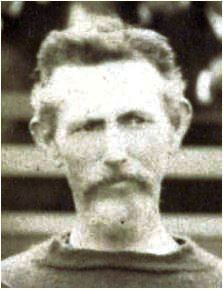
Could this be T. S. Marshall? - from a 1881 photo of former Carlton players. See October 1881
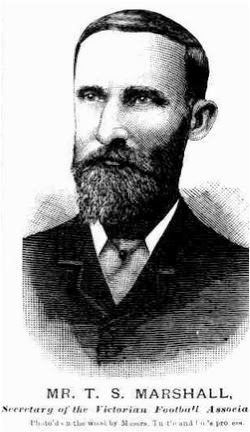
T. S. Marshall 1887 Melb Punch April 07
The Scottish census of 1851 has him as of one of 10 people listed as living at the Greenock house. (20 miles N.W. Glasgow)
He is named as Theophilus Smith Marshall aged 11, born about 1840, however his death notice in The Argus has him as Theopheius Smith Marshall, which was probably a misprint.
It is not known when the family came to Melbourne.
In 1908 to celebrate the 50 years of Australian Football, The Argus published two articles on the game and in one mentions that T. S. Marshall took part in the famous 1858 Scotch College-Melbourne Grammar match.
To read this report see Pre VFL Rules of Football and scroll down the page to 1908.
Tom Marshall initially played for the Emerald Hill Football Club in 1859.
He later played for Royal Park in 1863.
The Royal Park club was founded in 1862, and is mentioned as being a "new club" in a report of matches played on 9 August 1862.
See T.S Marshall, Tribute at the bottom of this page.
1863 May 30
Royal Park played Eastern Hill at Royal Park.
Royal Park won 2-0
Marshall scored both goals and captained the Parkites.
In 1863, Royal Park vs Melbourne.
T. S. Marshall (Royal Park captain) was concerned that the bouncing the ball rule (1859) was being abused.(supposed to be bounced every 10-20 yards)
He instructed Jim A. Clark to run as far as he can without bouncing the ball.
When Clarke ran 50 yards the Melbourne captain H.C.A. Harrison was stunned.
He asked Marshall what this meant, and Marshall replied that he wanted the rule defined.
They then agreed that the ball had to be bounced every 10 yards.
New laws in 1866 required the ball to be bounced every 10 yards.
1866 Transferred to Carlton from Royal Park at the beginning of the season, and played in the Vice-President's 20 vs the President's Twenty.
Another report said he was playing for Carlton about 1864.
1866 Captained Carlton along with Jack Conway and Harry Chadwick .
1867 In the centre and was another effective player for Carlton during the season.
1868 Outstanding player for Carlton during the season.
1869 Played in the opening match against Geelong at Royal Park Queen's Birthday May 22.
( The Carlton Story, H. Buggy and H. Bell p11,13,14,17,18)
1870 April 28
T. Marshall was elected onto the committee at the Carlton AGM.
1870 Outstanding player for the season.
(Centenary Souvenir of Carlton Football Club p9)
1871 T. S. Marshall left for the North-Eastern District of Victoria.
1881 T. S. Marshall was appointed the first Head Teacher of the newly built Kensington School No.2374. He was head master from 1881-1894.
He was also a Lieutenant-Colonel in the Militia.
Marshall instituted a Cadet Corps at the school, and trained the pupils in all aspects of Military Drill, particulary rifle shooting. The school won the Sargood Shield for rifle shooting competing against other state and private schools.
While teaching at the school and living in McCracken street he began the local Volunteer Fire Brigade.
Appears in the 1887 Carlton Football Club team photo as an official.

1887 April 2
The Argus in it's season preview says of T. S. Marshall;
"And now for the association. As last year, Mr. T. S. Marshall is honorary secretary, and a better man for the position would be hard to find. Years ago he was identified with the Carlton club, and on leaving Melbourne he carried the love of the game into the North-Eastern district.
Along the Murray valley he took a leading part in establishing some very capable twenties, and returning to Melbourne finds himself in his natural place as head of the association. And the table for attendances for last year, which were circulated at the last meeting of the association, show his interest in the game has not waned.
Nineteen meetings of the association were held last season, and Mr. Marshall was not once absent. The Permit and Umpire committee met on 22 occasions, and here again he attended every meeting, though in each case he stands alone in the enjoyment of this distinction."
1888...was stated to have done more than anyone in Victoria to foster our National game.
Three weeks later the V.F.A. presented him with a testimonial in recognition of his services as secretary.
T. S. Marshall, former Carlton Captain and vice-president, remained with the Victorian Football Association as secretary, and did not apply for the secretaryship of the new Victorian Football League when it was advertised late in 1896.
Marshall, the Association's Secretary, suggested that the V.F.A. take complete control of all clubs' finances, collecting the gate money, paying club's bills, and handing what was left over to charity.
(The Carlton Story, H. Buggy and H. Bell p79)
The Old Dark Navy Blues, Lionel Frost. p33.)
1888
Marshall devised and proposed the current system of premiership points - 4 for a win and 2 for a draw.
1890 June
The Carlton Football Club was in Sydney to play a match against Tasmania.
At the reception for the teams held at the town hall by the Mayor of Sydney, the brother of T. S. Marshall, Walter C. Marshall, toasted the two teams.
He had been in Sydney for 20 years and had done more than anyone to promote the game there.
The report said he was a former footballer and cricketer with Carlton and North Melbourne.
1891 June 11
T. S. Marshall was named manager of the Victorian team to play South Australia in Adelaide.
Carlton representatives were Sutton and Hutchinson.
1891 September 28
From The Age end of season review;
"It is gratifying to be able to record that Mr. T. S. Marshall, hon. sec to the Victorian Football Association, and the central figure amongst leaders of the game, has again been found at his post, active and energetic as of yore and ever anxiously striving to minimise the evil effects of those nefarious influences respecting which he has in the past boldly and frequently spoken words of warning.
His efforts to free the game from reproach have been unceasing, and what ever may be the future of Victorian football he will deservedly be recognised by posterity as one of it's most ablest law makers and worthiest supporters."
1892 May 03
The secretary of the V.F.A. Mr. Marshall wrote to the M.C.C. about a newspaper report regarding it's employment of M.F.C. footballers and hints of possible professionalism.
To read Marshall's letter, click here> http://nla.gov.au/nla.news-article8416438
1892 June 09
Olympus - Melbourne Punch (p11)
"Similarly the statement that Mr. Marshall was the prime mover in deciding the premiership by points is totally incorrect, as the system was advocated in these columns nearly twelve months before Mr. Marshall took up the idea, with the difference of substituting Possible Proportional Points for Actual Points Obtained." George F. Bowen aka Olympus
1894 July 13
Australian vs Rugby Football
T. S. Marshall wrote to the editor of The Broadford Courier & Reedy Creek Times in reply to an item on Australian Football.
To read his letter click here> http://nla.gov.au/nla.news-article58881780
The letter to which Marshall was replying to can be read here> http://nla.gov.au/nla.news-article58881592
1894
"Upon leaving Kensington (school) he was was appointed as Chief Fire Officer for the Country Fire Brigade, accepting a pay cut in salary from £500 to £200 pa. He remained Chief Fire officer for 32 years, during which time, the number of Brigades grew from 30 to 103. His portrait is displayed in nearly every C.F.A. station in Victoria and his name revered in fire fighting circles."
(Kensington P.S. 100 year celebration pamphlet, 1981)
1902 April 17 Friday
At the V.F.A. annual meeting held at Young and Jacksons Hotel, thanks were passed to T. S. Marshall who had announced that he was leaving the V.F.A.
The meeting was chaired by former Carlton great Billy Dedman.
1906 May 03 Thursday
A meeting of the Commonwealth Rifle Association was held at the Naval and Military Club. Among those present was Captain T. S. Marshall (Vic.)
1908 Hobart's The Mercury, published The Age's tribute to T. S. Marshall.
To read the article, see Links at the bottom of this page, and click "A Deserved Tribute".
1908 April 08
Major T. S. Marshall was manager of the Australian rifle team that toured Britain and Canada. He addressed the Commonwealth Rifles Association meeting with his report of the tour.
It was intended to present Major Marshall with an illuminated address.
1909 March 28
"In his day Mr. Marshall was a fine player. In 1859 he played for Emerald Hill, in 1863 for Royal Park, and from 1864 to 1870 for Carlton.
He retained the office of secretary to the Victorian Football Association until 1897, when the eight leading teams seceded and formed the League. During the whole of his career as player and officer of the Association Mr. Marshall always had the good of the game at heart, and to him belongs the credit of introducing the payment of umpires, appointment of timekeepers, the changing of ends at the close of each quarter, and the deciding of matches on points. Mr. Marshall also advocated the appointment of boundary umpires nearly 20 years ago."
(Trove; Sun, Kalgoorlie March 28 1909 p3)
1918
The Argus October 11.
Sergeant R. Walter C. Marshall has been awarded the Military Medal and received a commissoned rank. He is the youngest son of T. S. Marshall. Two other sons are on active service, one was with the first landing in Gallipoli.
1924 T. S. Marshall was the timekeeper in an old players match at the M.C.G. on September 26.
1925 December 01
The Mercury (Hobart);
Melbourne, November 30
When a fire broke out in his bedroom in the Commercial Hotel, Stawell, on Saturday morning, the chief officer of the Country Fire Brigades Board (Mr. T. S. Marshall), who is aged 84 years, was almost overcome by the smoke and heat, and but for the timely assistance of the secretary of the Board (Mr. Chellew) a tragedy might have occurred.
Mr. Marshall revived when he was carried from the building, and the fire was extinguished before much serious damage had been done.
1926 July 01
At a meeting of the Country Fire Brigades Board, Mr. T. S. Marshall announced his retirement from September 30, when he will have completed 32 years of service. He will take two months leave from the end of July and intends to complete his history of the Fire Brigades Board and the brigades under it's control.
1926 - Football in the Early Days.
T. S. Marshall reminiscing on his playing days.To read, click here> http://nla.gov.au/nla.news-article3786016
Both Robertson and Gardiner would have been in approx 79, and Marshall 89 years of age.
1932 August 31
The Sporting Globe (p10)
"Mr. T. S. Marshall, 92 years of age and the oldest living senior footballer in Victoria was thrilled with a telegram he received from the veteran's carnival committee on Friday.
He conveys his best wishes to all players - young and old - and expresses the hope that the great game will continue to prosper."
1933 January 4
T. S. Marshall died suddenly at home at 4 Tennyson Street St.Kilda.
He was survived by a widow, three daughters and two sons.
His funeral was held at the Melbourne General Cemetery.
From his obituary in The Argus, January 6th, 1933.
Colonel Marshall was also closely associated with the development of the Australian game of football in Victoria.
He was once captain of the Carlton Football Club, and he was secretary of the Victorian Football Association for 20 years. His period in office ended when the League broke away from the Association.
He was a close friend of the "father of Australian football," Mr. H. C. A. Harrison, and with him Lieut.-Colonel Marshall helped to procure the codified laws of the game.
He was also responsible for the expansion of the Country Fire Brigade.
To read The Argus' obituary in full, click here> http://nla.gov.au/nla.news-article4518010
1933
The Mercury in Hobart in tribute, said;
Mr. Marshall was,
Responsible for changing ends at each quarter.
Appointment of time keepers.
Payment of umpires.
Field umpire using a whistle.
Prime mover in bring about intercolonial football conferences.
Deciding the premiership by the points system.
A strong opponent of professionalism in football.
To read the Mercury's obituary click here> http://nla.gov.au/nla.news-article24700925
MARSHALL'S HISTORY OF FOOTBALL FOUND.
1934 April 14During recent renovations at Young and Jacksons Hotel, workers found a cache of papers including VFA minute books dating from 1877 - 1883. The VFA had held their monthly meetings at the hotel.
The Herald published an article which appeared on page 30. Included in the papers found, was T. S. Marshall's history of football which dated from football's embryonic period of 1856, right through to his final year as secretary of 1896.
Marshall had filed the history in with the VFA Annual Report.
The Herald said the documents were handed over to the VFL.
If anyone know the whereabouts of Marshall's history of the game please contact Blueseum.
To read the Herald's article: http://nla.gov.au/nla.news-article243257621
1950 April 01 The Argus.
In 1936 the Kensington State School (No.2374), formed an Old Scholars' Association (Marshall period)
It was formed to perpetuate the memory of the late T. S. Marshall who died in 1933.
Membership in 1950 is 400, confined to pupils who attended the school between 1880-1894.
He was head master of the school from 1881-1894.
As a memorial, a plaque and a oil painting was placed in the school main entrance hall in 1953.
The Blueseum was recently contacted (April 2011) by the principal of the Kensington Primary School, and the above works of art are still on display at the the school. Blueseum has been invited to to take photographs, and will provide some information on T. S. Marshall for the school as it prepares for it's 130 year celebration in May 2011.
Kensington Primary School is located in McCracken Street, Kensington.
The street name also has an Australian Football connection in that the McCracken brewing family were the prime movers in starting the Essendon Football Club.
Blueseum would like to contact Marshall's relatives for further information on T. S. and his brother Walter C. Marshall's story. A photo of Walter would be greatly appreciated.
(See Home Page for contact details)
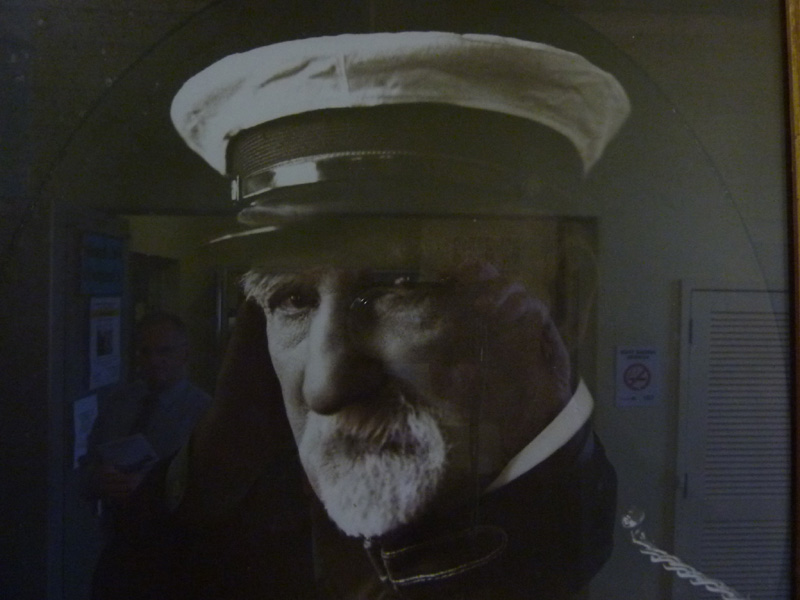
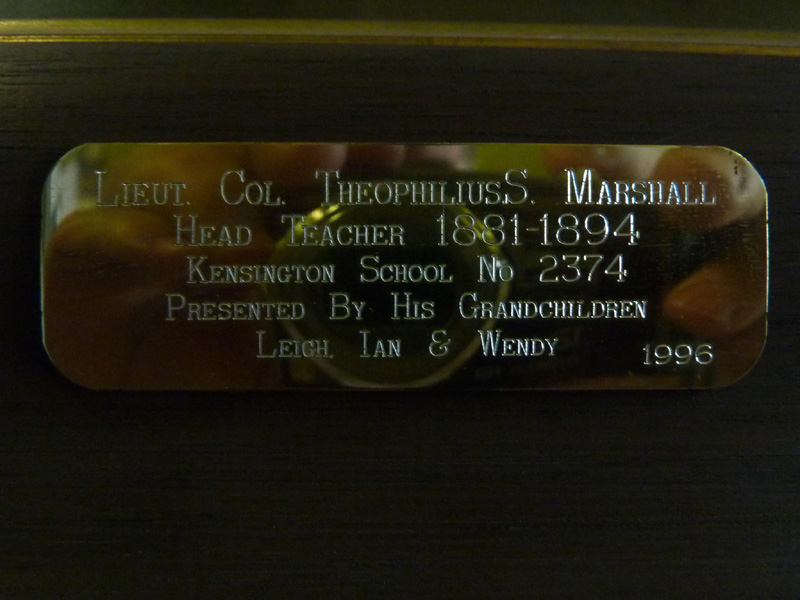
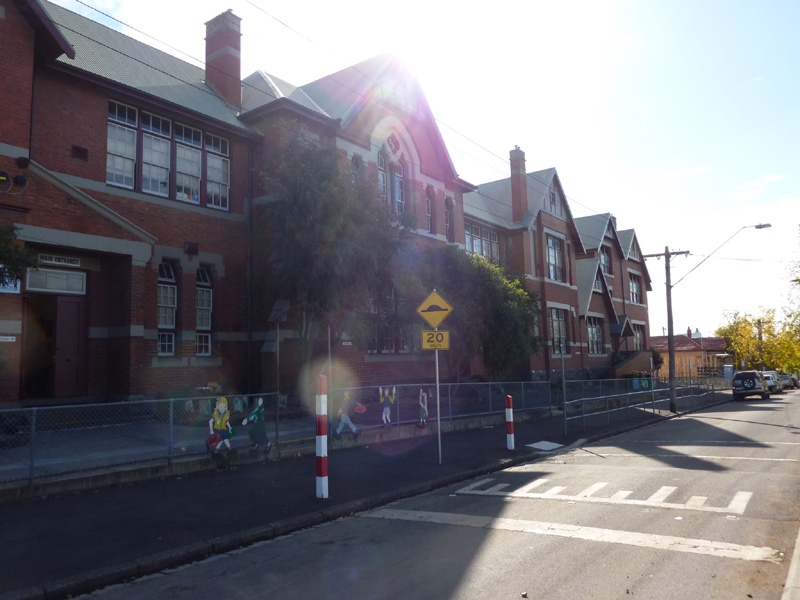
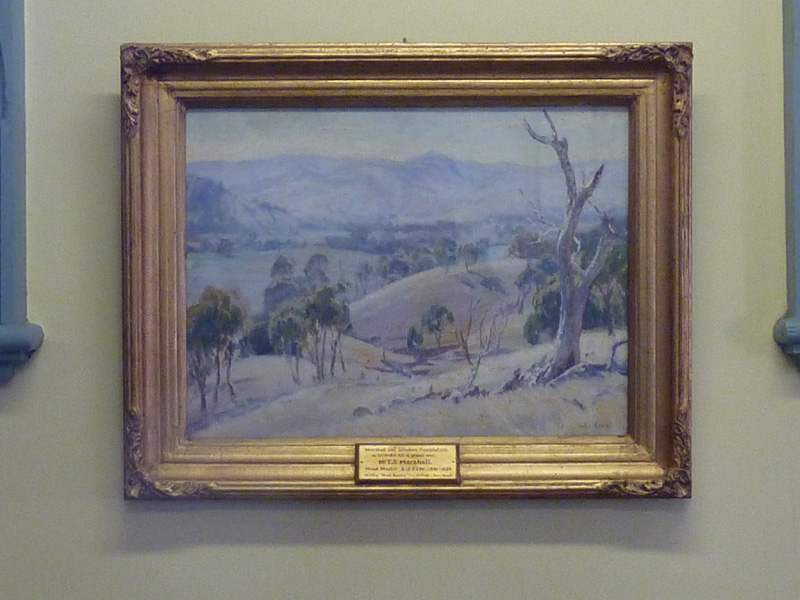
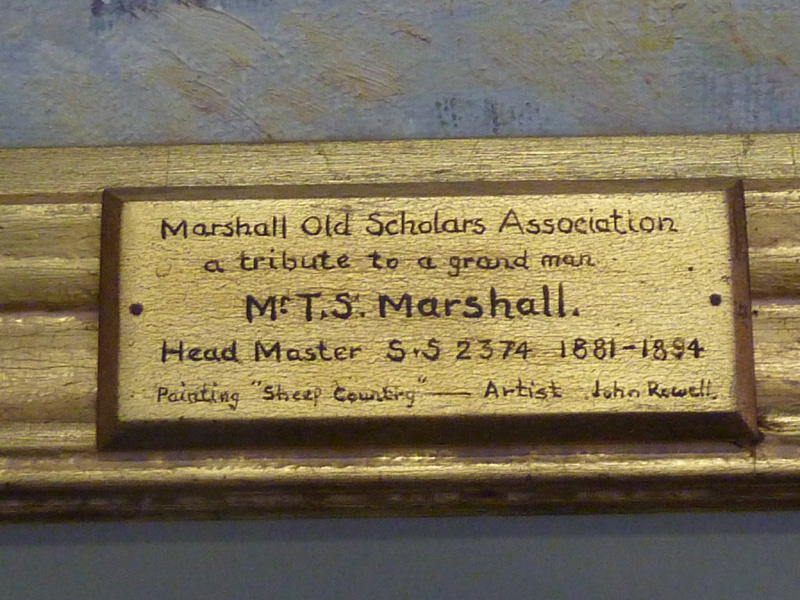
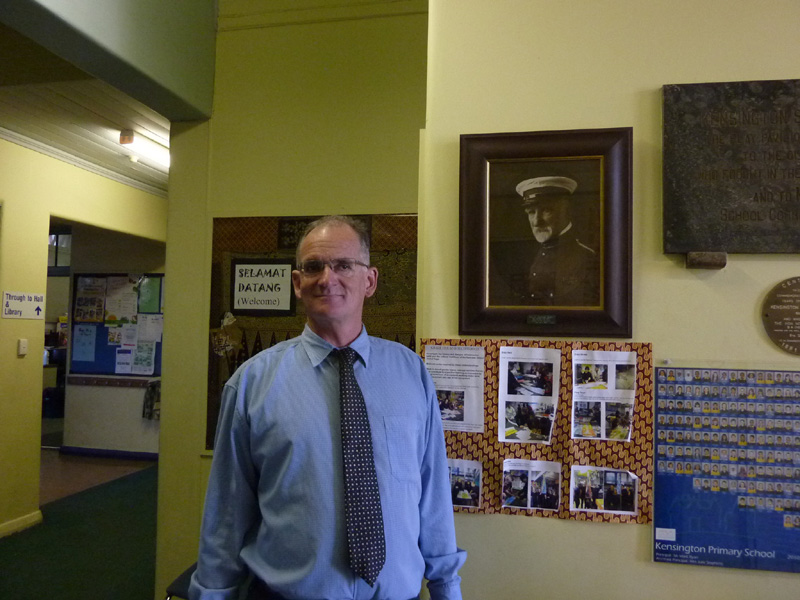
(Kensington P.S. Principal Mark Ryan alongside Marshall's portrait.)
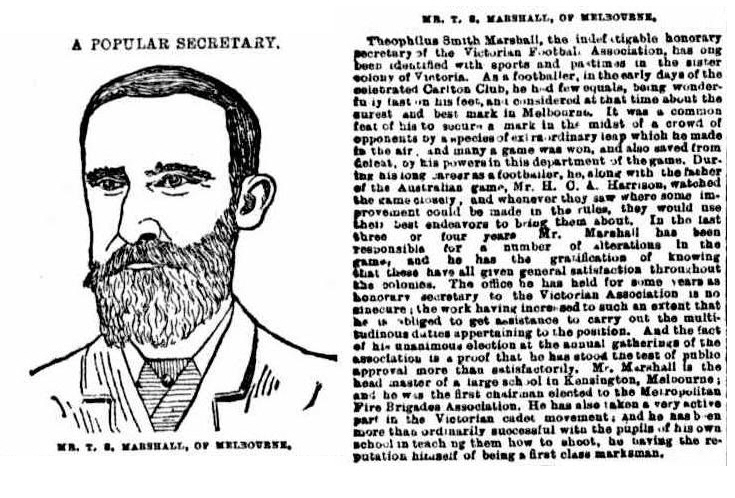
(Australian Town & Country Journal N.S.W. July 30 1887 p39)
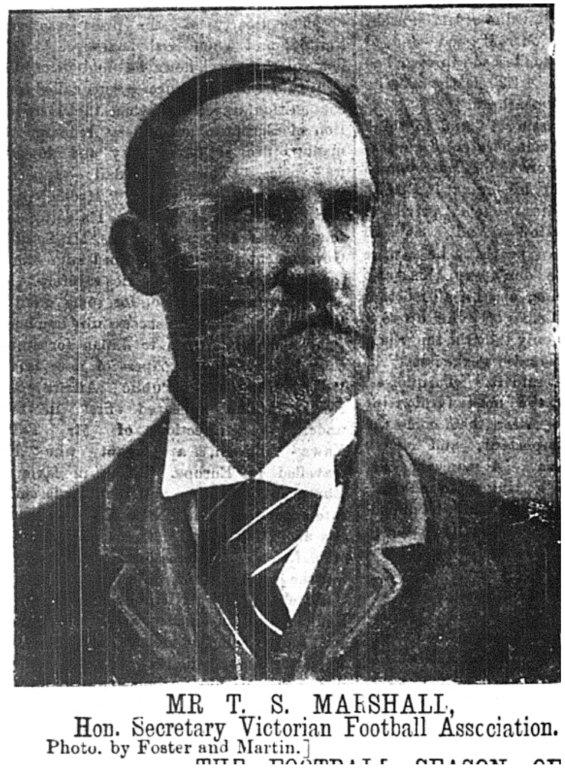
The Sporting Globe in 1937 August 21 (p8) ran a series of articles over three Saturdays based on Marshall's reminiscences of the early days of football and his time as hon.sec of the VFA.
The first of these articles can be viewed here> http://nla.gov.au/nla.news-article180838827
Footnote:
The image of Marshall wearing the white cap of the Chief Officer of the Country Fire Brigade once hung in all Country Fire Brigade (now CFA) stations throughout Victoria.At a rural Historical Society in 2018 this writer saw this photograph lying amongst a group of other photos and asked the curator, "Who is this?" She said it was "a river boat captain, " but she could not provide any further information about him.
She was very surprised when shown this Blueseum page. The curator said that the photograph would go straight back to the local CFA unit to be re-hung on the wall.
Links
Original articleA Deserved Tribute. Click here
Blueseum: Pre VFL Players | Pre VFL Captains | Pre VFL Administrators
